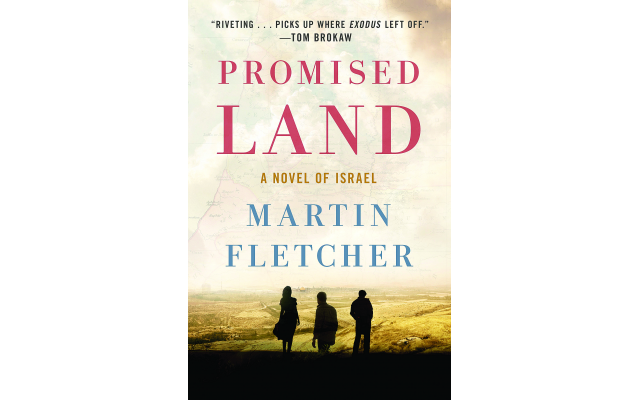Promised Land: A Novel of Israel
By Author: Martin Fletcher
Dave Schechter is a veteran journalist whose career includes writing and producing reports from Israel and elsewhere in the Middle East.
“Promised Land: A Novel of Israel,” by Martin Fletcher, blends fictional characters and historical events in Israel’s early years.
In 1950, two years after the modern nation of Israel declared its independence, just 35 percent of its 806,000 citizens were sabras, native born.
Post-Holocaust refugees from Europe and the former residents of Arab nations alike faced the task of reinventing themselves.
The lives of three such people are at the center of “Promised Land,” whose author is among the longest-serving foreign correspondents in Israel. He is best known for his more than 30 years reporting for NBC from Israel and the Middle East.
“Promised Land” takes readers on an 18-year trip, as Fletcher blends his fictional characters with familiar Israeli names from the years 1949 to 1967, as their lives dovetail with real events.
Peter, sent to America as a teenager by his German parents to escape the pending destruction of their Jewish world, grows up with a gentile family in the Midwest.
His younger brother, Aren, emerges from Ausch-witz without his family and scarred by the experiences that kept him alive when so many others died.

Tamara and her family flee a comfortable life in Egypt, only to find themselves in squalor among the Mizrahi Jews looked down on by the Ashkenazim, particularly the haughty “yekkes,” the Jews of German descent.
When the brothers reunite in Israel, Peter has become a silent defender of their new homeland while Aren, who has taken the more Israeli name of Arie (the lion), is a wheeler-dealer looking for his next score.
The brothers have exchanged their family name, Berg, for the more Israeli ben Nesher (the eagle).
The wheels of the story begin turning when Peter, and then Arie, meet Tamara.
Both could be accused of taking advantage of the young Egyptian woman, even though she engages willingly, and over time the benefits of her new relationships accrue not only to her, but to her parents and siblings.
“In this strange new country where everyone was reinventing themselves, all the traditions and niceties of relationships in Egypt were lost. Here you didn’t gain respect with age, but lost it. At the head of the table the virtues and wisdom and knowledge were replaced by money and power, the gentle hand replaced by sharp elbows and a big mouth,” Fletcher writes.
But in his next sentence, the author asks: “How else could it be though, in a nervous, scared nation threatened by annihilation at any moment?”
Peter rises in the ranks of those staving off annihilation, while Arie takes every opportunity to get ahead, no matter whether those close to him are hurt along the way.
Tamara, who has cast her lot with Arie, grows stronger with every episode she endures, though neither she nor Peter lose sight of each other, even while Peter creates a family of his own.
Fletcher’s knowledge of this historical and geographic landscape, a byproduct of his journalistic experience, is what makes “Promised Land” work.
He leads readers through Israel’s crucial early years, the threats from without that test its security apparatus, and the threats from within, including the boom-and-bust of its economy.
There are twists along the way, some readers may see coming and others that surprise.
“Promised Land” ends soon after the June 1967 six-day war and portends some of the challenges Israel has faced since. I am left wishing that Fletcher had revealed more about the future lives of his protagonists. Perhaps the years that followed in Israel’s history will be worthy of a sequel.
Fletcher will discuss “Promised Land” when he speaks at the Book Festival of the MJCCA, at 12:30 p.m. Nov. 8.




comments